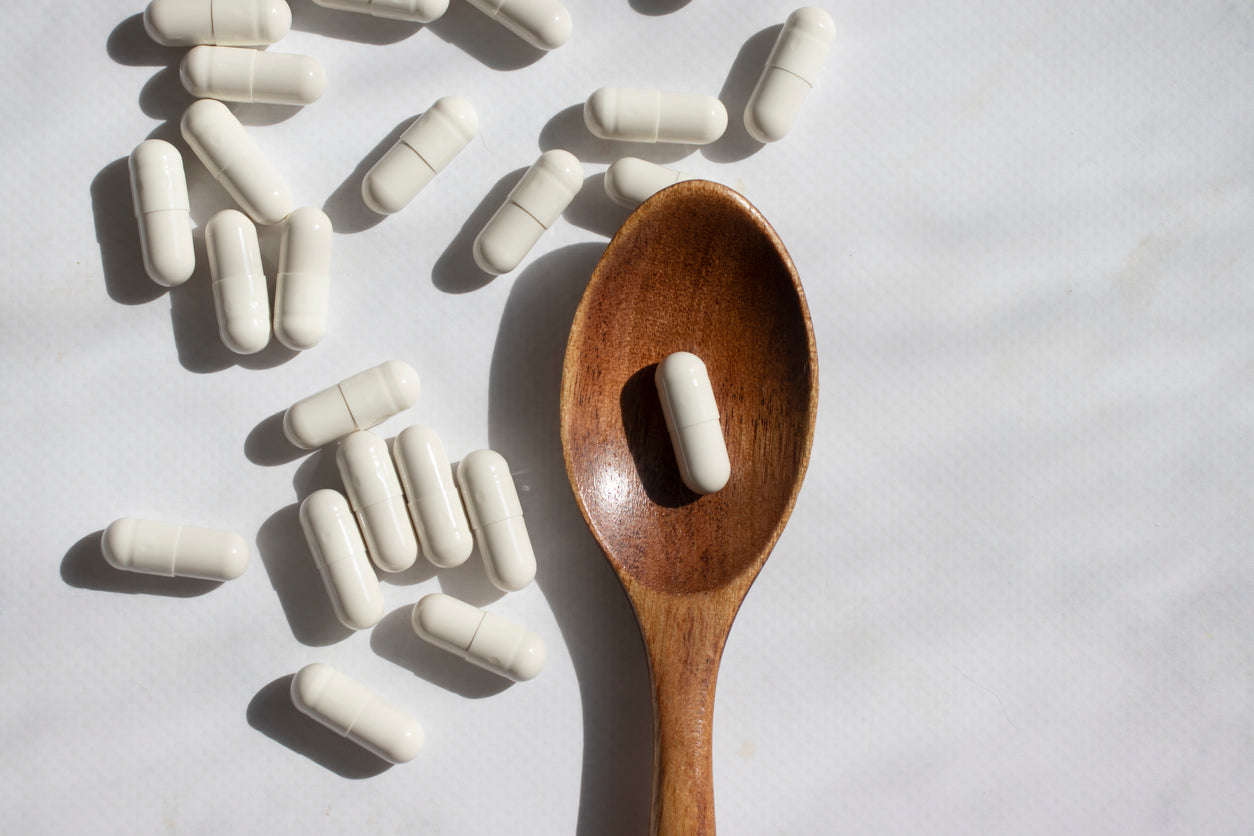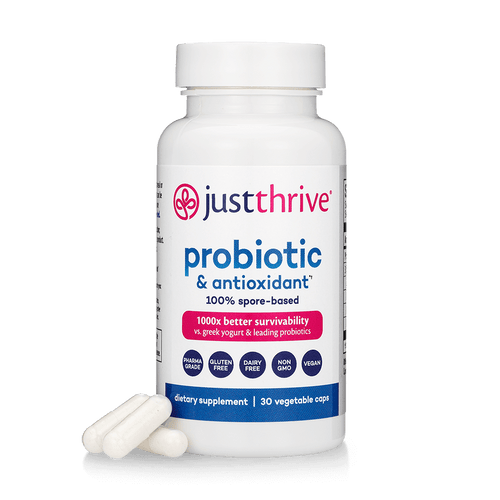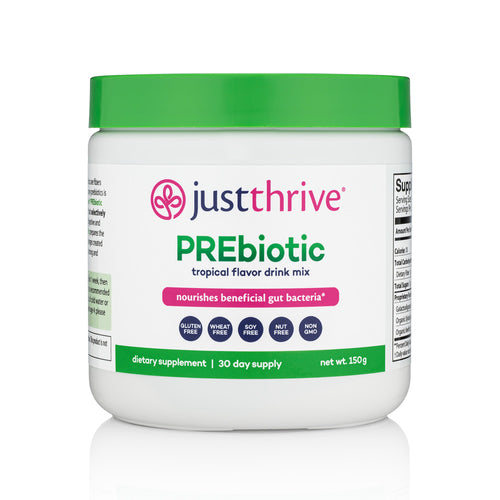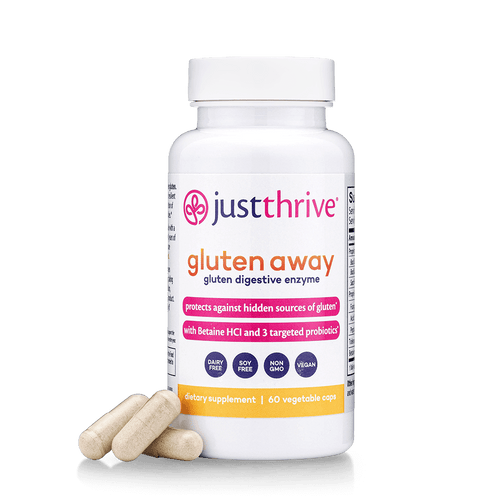You’re probably familiar with probiotics – live microorganisms that work with your body to power your best health… But how much do you know about prebiotics?
Though prebiotics don’t get as much press or attention, the specialized plant fibers are vital to your overall health and wellness. In fact, you can’t be truly healthy without them.
In this blog, we'll explore the many ways prebiotics promote good health (beyond just your digestion), their impact on your entire body, plus how to choose the right prebiotics and ensure you're getting enough for optimal wellness.
What Are Prebiotics?
First things first – Despite what you might see on social media, prebiotics are not the same as probiotics. Not even close. Probiotics are beneficial bacteria that live in your gut microbiome and help keep your digestive system, immune system, and nearly every critical system in your body running smoothly and efficiently. PREbiotics, on the other hand, are probiotics’ favorite food source – Helping them grow, multiply, and flourish in the gut.
They’re a special class of fiber found naturally in fruits, vegetables, whole grains, and legumes. Our bodies can’t digest prebiotic fiber, making it fully available to be eaten by the bacteria in your gut.
Prebiotics work for probiotics the way fertilizer works for your garden. They nourish beneficial bacteria and help them take root in the gut, allowing for a healthy and diverse probiotic population. Unfortunately, just like some fertilizers promote weed growth, some types of prebiotics feed harmful pathogenic bacteria… and that can lead to an imbalance, like a garden overrun with weeds.
That’s why it’s so important to choose prebiotics that probiotic bacteria love but pathogens aren’t interested in. These “intelligent” prebiotics preferentially nourish beneficial bacteria only, keeping your gut “garden” in healthy balance. They include:[1]
- Fructooligosaccharides
- Galactooligosaccharides
- Xylooligosaccharides
While there are other types of prebiotics out there, you can’t be sure they won’t feed the weeds. So if you decide to try prebiotics, look for forms specifically designed to sustain only beneficial probiotic bacteria.

 Want to listen instead of read?CLICK HERE
Want to listen instead of read?CLICK HERE
4 Ways The Right Prebiotics Keep You Healthy
Numerous clinical studies show that prebiotics are crucial in order for you to stay fit and healthy.[2] They carry out important body-wide tasks, and there’s nothing else that can accomplish prebiotics’ most important jobs:
- Promote a fully diverse gut microbiome rich in probiotic bacteria. Probiotics need prebiotics to survive and thrive.[3]
- Decrease pathogenic bacteria populations. Prebiotics can make it harder for pathogens to adhere to the intestinal wall, which limits their survivability.[4]
- Increase production of short chain fatty acids (SCFA). Probiotics convert prebiotics into SCFAs, which are crucial for good health.[5]
- Support healthy and balanced immune system function.[6] By promoting the growth of beneficial gut bacteria, prebiotics help regulate immune responses, promote healthy inflammation, and support your natural resistance.
Through these beneficial actions, prebiotics play a starring role in your physical and mental health. Their contributions affect practically every cell, every system in your body. And you need a plentiful and constant supply to stay well and feel your best.
Prebiotics Affect Health in Dozens of Ways
The main job of prebiotics is feeding probiotic bacteria… but they do so much more for your overall health and wellness. And there’s a growing stack of research confirming their dozens of proven health benefits.[7] Studies show that prebiotics help support:
- digestive health[8]
- healthy colon cells[9]
- a strong, effective gut barrier[10]
- healthy inflammatory responses[11]
- balanced cholesterol levels[12]
- healthy blood sugar management[13]
- bone density and strength[14]
- heart health[15]
- healthy metabolism [16]
- stress management [17]
- good moods [18]
- clear thinking and focus [19]
- sound sleep [20]
- complete mineral absorption [21]
- healthy weight management [22,23]
This is just a sample of the many ways prebiotics keep you happy and healthy, and we’re learning more about these amazing nutrients every day.
Getting more prebiotics is a sure way to support your best health… The trick is making sure you use the right prebiotic supplements.

Choosing the Right Prebiotics for You
There are several different types of prebiotics, but they don’t all work the same way.
Some of the most common prebiotics include:
- Galactooligosaccharides (GOS)
- Fructooligosaccharides (FOS)
- Xylooligosaccharides (XOS)
- Oligofructose
- Inulin
And here’s where you need to use caution. Some prebiotics – such as oligofructose and inulin – commonly cause GI distress, like gas and bloating.[24] That makes them much harder to tolerate.
Luckily, prebiotics like GOS, FOS, and XOS aren’t known to cause gut distress, making them a more comfortable choice. Plus, GOS, FOS, and XOS specifically feed the most important beneficial bacteria in your gut microbiome which helps promote healthy diversity.
The Prebiotic Best Food Sources
It’s always a great idea to incorporate foods naturally rich in the right kind of prebiotic fiber. Some of the best options include:
Galactooligosaccharides (GOS): legumes such as lentils, chickpeas, and beans.
Fructooligosaccharides (FOS): garlic, onion, leeks, blue agave, yacon root, chicory root, Jerusalem artichokes, and asparagus.
Xylooligosaccharides (XOS): barley hulls, gram husk, almond shells, bamboo, corn cob, and straw
Here’s the only rub about limiting your prebiotic intake to food alone – It’s not always possible to get enough of the right kind of prebiotics through diet alone.
The Easiest Way To Get Your Daily Dose Of Prebiotics
Because it can be challenging to get the right amount of prebiotics your body needs daily through diet alone, many people choose to supplement with a high-quality prebiotic like Just Thrive Precision PREbiotic.
Precision PREbiotic contains an exclusive blend of GOS, FOS, and XOS specifically designed to feed the diverse population of beneficial bacteria you want in your gut microbiome. Precision PREbiotic acts like fertilizer for only probiotic bacteria, increasing the most desirable strains.
Plus, Precision PREbiotic helps maintain your wellness by supporting healthy:
- digestion
- immunity
- moods
- weight management
- metabolism
- and so much more!
Be proactive about staying healthy by giving your body what it needs to thrive.
>> Try Precision PREbiotic today and save 22% when you choose a subscription.
And remember:
EVERY Just Thrive purchase is covered by our Bottom of the Bottle, 100% money back guarantee.
That means you can try Precision PREbiotic to see how well it works for you… and we’re betting that you’ll notice a positive difference.
But if for any reason you don’t feel a difference, you can ask for a full product refund at any time. Even if it’s 3 months or 3 years later… Even if the bottle is empty!
>> Try Precision PREbiotic 100% RISK FREE Today
Resources
1 Pham VT, Calatayud M, Rotsaert C, Seifert N, Richard N, Van den Abbeele P, Marzorati M, Steinert RE. Antioxidant Vitamins and Prebiotic FOS and XOS Differentially Shift Microbiota Composition and Function and Improve Intestinal Epithelial Barrier In Vitro. Nutrients. 2021 Mar 29;13(4):1125. doi: 10.3390/nu13041125. PMID: 33805552; PMCID: PMC8066074.
2 Neri-Numa IA, Pastore GM. Novel insights into prebiotic properties on human health: A review. Food Res Int. 2020 May;131:108973.
3 Bedu-Ferrari C, Biscarrat P, Langella P, Cherbuy C. Prebiotics and the Human Gut Microbiota: From Breakdown Mechanisms to the Impact on Metabolic Health. Nutrients. 2022 May 17;14(10):2096. doi: 10.3390/nu14102096. PMID: 35631237; PMCID: PMC9147914.
4 Davani-Davari D, Negahdaripour M, Karimzadeh I, Seifan M, Mohkam M, Masoumi SJ, Berenjian A, Ghasemi Y. Prebiotics: Definition, Types, Sources, Mechanisms, and Clinical Applications. Foods. 2019 Mar 9;8(3):92. doi: 10.3390/foods8030092. PMID: 30857316; PMCID: PMC6463098.
5 Holmes ZC, Villa MM, Durand HK, Jiang S, Dallow EP, Petrone BL, Silverman JD, Lin PH, David LA. Microbiota responses to different prebiotics are conserved within individuals and associated with habitual fiber intake. Microbiome. 2022 Jul 29;10(1):114. doi: 10.1186/s40168-022-01307-x. PMID: 35902900; PMCID: PMC9336045.
6 Pujari R, Banerjee G. Impact of prebiotics on immune response: from the bench to the clinic. Immunol Cell Biol. 2021 Mar;99(3):255-273. doi: 10.1111/imcb.12409. Epub 2020 Nov 2. PMID: 32996638.
7 Hills RD Jr, Pontefract BA, Mishcon HR, Black CA, Sutton SC, Theberge CR. Gut Microbiome: Profound Implications for Diet and Disease. Nutrients. 2019 Jul 16;11(7):1613.
8 Camilleri M. Human Intestinal Barrier: Effects of Stressors, Diet, Prebiotics, and Probiotics. Clin Transl Gastroenterol. 2021 Jan 25;12(1):e00308. doi: 10.14309/ctg.0000000000000308. PMID: 33492118; PMCID: PMC7838004.
9 Mahdavi M, Laforest-Lapointe I, Massé E. Preventing Colorectal Cancer through Prebiotics. Microorganisms. 2021 Jun 18;9(6):1325. doi: 10.3390/microorganisms9061325. PMID: 34207094; PMCID: PMC8234836.
10 Camilleri M. Human Intestinal Barrier: Effects of Stressors, Diet, Prebiotics, and Probiotics. Clin Transl Gastroenterol. 2021 Jan 25;12(1):e00308. doi: 10.14309/ctg.0000000000000308. PMID: 33492118; PMCID: PMC7838004.
11 McLoughlin RF, Berthon BS, Jensen ME, Baines KJ, Wood LG. Short-chain fatty acids, prebiotics, synbiotics, and systemic inflammation: a systematic review and meta-analysis. Am J Clin Nutr. 2017 Sep 1;106(3):930-945. doi: 10.3945/ajcn.117.156265. PMID: 28793992.
13 Mahboobi S, Rahimi F, Jafarnejad S. Effects of Prebiotic and Synbiotic Supplementation on Glycaemia and Lipid Profile in Type 2 Diabetes: A Meta-Analysis of Randomized Controlled Trials. Adv Pharm Bull. 2018 Nov;8(4):565-574. doi: 10.15171/apb.2018.065. Epub 2018 Nov 29. PMID: 30607329; PMCID: PMC6311648.
12 Nath A, Molnár MA, Csighy A, Kőszegi K, Galambos I, Huszár KP, Koris A, Vatai G. Biological Activities of Lactose-Based Prebiotics and Symbiosis with Probiotics on Controlling Osteoporosis, Blood-Lipid and Glucose Levels. Medicina (Kaunas). 2018 Dec 3;54(6):98. doi: 10.3390/medicina54060098. PMID: 30513975; PMCID: PMC6306850.
14 Whisner CM, Weaver CM. Prebiotics and Bone. Adv Exp Med Biol. 2017;1033:201-224. doi: 10.1007/978-3-319-66653-2_10. PMID: 29101657.
15 Wu H, Chiou J. Potential Benefits of Probiotics and Prebiotics for Coronary Heart Disease and Stroke. Nutrients. 2021 Aug 21;13(8):2878. doi: 10.3390/nu13082878. PMID: 34445037; PMCID: PMC8401746.
16 You S, Ma Y, Yan B, Pei W, Wu Q, Ding C, Huang C. The promotion mechanism of prebiotics for probiotics: A review. Front Nutr. 2022 Oct 5;9:1000517. doi: 10.3389/fnut.2022.1000517. PMID: 36276830; PMCID: PMC9581195.
17 Schmidt K, Cowen PJ, Harmer CJ, Tzortzis G, Errington S, Burnet PW. Prebiotic intake reduces the waking cortisol response and alters emotional bias in healthy volunteers. Psychopharmacology (Berl). 2015 May;232(10):1793-801. doi: 10.1007/s00213-014-3810-0. Epub 2014 Dec 3. PMID: 25449699; PMCID: PMC4410136.
18 Ansari F, Pourjafar H, Tabrizi A, Homayouni A. The Effects of Probiotics and Prebiotics on Mental Disorders: A Review on Depression, Anxiety, Alzheimer, and Autism Spectrum Disorders. Curr Pharm Biotechnol. 2020;21(7):555-565.
19 Serra MC, Nocera JR, Kelleher JL, Addison O. Prebiotic Intake in Older Adults: Effects on Brain Function and Behavior. Curr Nutr Rep. 2019 Jun;8(2):66-73. doi: 10.1007/s13668-019-0265-2. PMID: 30888666.
20 Thompson RS, Roller R, Mika A, Greenwood BN, Knight R, Chichlowski M, Berg BM, Fleshner M. Dietary Prebiotics and Bioactive Milk Fractions Improve NREM Sleep, Enhance REM Sleep Rebound and Attenuate the Stress-Induced Decrease in Diurnal Temperature and Gut Microbial Alpha Diversity. Front Behav Neurosci. 2017 Jan 10;10:240. doi: 10.3389/fnbeh.2016.00240. PMID: 28119579; PMCID: PMC5223485.
21 Whisner CM, Castillo LF. Prebiotics, Bone and Mineral Metabolism. Calcif Tissue Int. 2018 Apr;102(4):443-479. doi: 10.1007/s00223-017-0339-3. Epub 2017 Oct 27. PMID: 29079996; PMCID: PMC5851694.
22 Bertuccioli A, Cardinali M, Biagi M, Moricoli S, Morganti I, Zonzini GB, Rigillo G. Nutraceuticals and Herbal Food Supplements for Weight Loss: Is There a Prebiotic Role in the Mechanism of Action? Microorganisms. 2021 Nov 25;9(12):2427.
23 Ben Othman R, Ben Amor N, Mahjoub F, Berriche O, El Ghali C, Gamoudi A, Jamoussi H. A clinical trial about effects of prebiotic and probiotic supplementation on weight loss, psychological profile and metabolic parameters in obese subjects. Endocrinol Diabetes Metab. 2023 Mar;6(2):e402.
24 Bonnema AL, Kolberg LW, Thomas W, Slavin JL. Gastrointestinal tolerance of chicory inulin products. J Am Diet Assoc. 2010 Jun;110(6):865-8. doi: 10.1016/j.jada.2010.03.025. PMID: 20497775.














